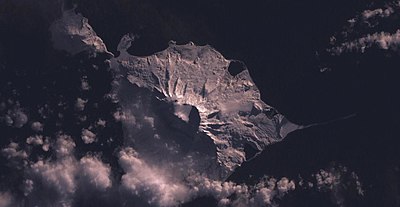| Revision as of 01:29, 11 October 2012 editGerixau (talk | contribs)Extended confirmed users2,187 editsNo edit summary← Previous edit | Revision as of 13:09, 5 December 2012 edit undoYobot (talk | contribs)Bots4,733,870 editsm clean up, References after punctuation per WP:REFPUNC and WP:PAIC using AWB (8748)Next edit → | ||
| Line 4: | Line 4: | ||
| '''Big Ben''' is a ] ] that dominates the geography of ] in the southern ]. It is a composite cone with a diameter of approximately 25 kilometres. Its highest peak is ], which is 2,745 m ]. Much of it is covered by ice, including 14 major ]s which descend from Big Ben to the sea. Big Ben is the highest mountain in Australian Territory. A smaller volcanic headland, the ], extends approximately 10 km to the northwest, created by a separate volcano, ]; its highest point is ], at 715 m. | '''Big Ben''' is a ] ] that dominates the geography of ] in the southern ]. It is a composite cone with a diameter of approximately 25 kilometres. Its highest peak is ], which is 2,745 m ]. Much of it is covered by ice, including 14 major ]s which descend from Big Ben to the sea. Big Ben is the highest mountain in Australian Territory. A smaller volcanic headland, the ], extends approximately 10 km to the northwest, created by a separate volcano, ]; its highest point is ], at 715 m. | ||
| ==Volcanic activity== |
==Volcanic activity== | ||
| Volcanic activity at the cone has been known since 1881. An ] occurred in 1993<ref></ref> |
Volcanic activity at the cone has been known since 1881. An ] occurred in 1993.<ref></ref> Satellite images detected eruptions during 2000. On 2 February 2001, observations from ], 15 km NW of Mawson Peak, showed plumes up to 1 km high over the volcano. Satellite images showed hotspots at various times from 2003 to 2008, and during September 2012.<ref></ref> | ||
| ==See also== | ==See also== | ||
| Line 13: | Line 13: | ||
| {{reflist}} | {{reflist}} | ||
| * {{cite book | last = LeMasurier | first = W. E. | coauthors = Thomson, J. W. (eds.) | title = Volcanoes of the Antarctic Plate and Southern Oceans | publisher = ] | year = 1990 | isbn = 0-87590-172-7 | page = 512 pp }} | * {{cite book | last = LeMasurier | first = W. E. | coauthors = Thomson, J. W. (eds.) | title = Volcanoes of the Antarctic Plate and Southern Oceans | publisher = ] | year = 1990 | isbn = 0-87590-172-7 | page = 512 pp }} | ||
| ==External links== | ==External links== | ||
| Line 24: | Line 23: | ||
| ] | ] | ||
| ] | ] | ||
| {{Subantarctic-geo-stub}} | {{Subantarctic-geo-stub}} | ||
Revision as of 13:09, 5 December 2012


Big Ben is a volcanic massif that dominates the geography of Heard Island in the southern Indian Ocean. It is a composite cone with a diameter of approximately 25 kilometres. Its highest peak is Mawson Peak, which is 2,745 m above sea level. Much of it is covered by ice, including 14 major glaciers which descend from Big Ben to the sea. Big Ben is the highest mountain in Australian Territory. A smaller volcanic headland, the Laurens Peninsula, extends approximately 10 km to the northwest, created by a separate volcano, Mount Dixon; its highest point is Anzac Peak, at 715 m.
Volcanic activity
Volcanic activity at the cone has been known since 1881. An eruption occurred in 1993. Satellite images detected eruptions during 2000. On 2 February 2001, observations from Atlas Cove, 15 km NW of Mawson Peak, showed plumes up to 1 km high over the volcano. Satellite images showed hotspots at various times from 2003 to 2008, and during September 2012.
See also
References
- LeMasurier, W. E. (1990). Volcanoes of the Antarctic Plate and Southern Oceans. American Geophysical Union. p. 512 pp. ISBN 0-87590-172-7.
{{cite book}}: Unknown parameter|coauthors=ignored (|author=suggested) (help)
External links
- Click here to see a map of Heard Island and McDonald Islands, including all major topographical features
- Location and history of Heard Island
53°06′30″S 73°31′30″E / 53.10833°S 73.52500°E / -53.10833; 73.52500
This subantarctic islands location article is a stub. You can help Misplaced Pages by expanding it. |